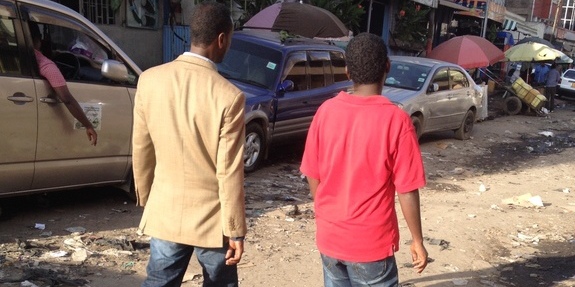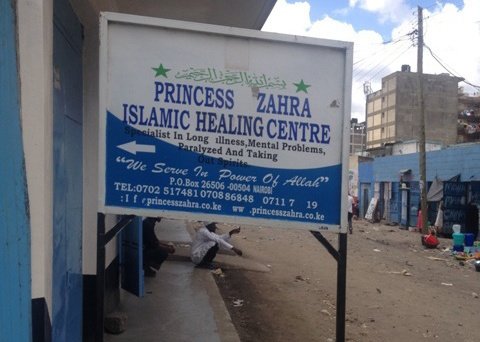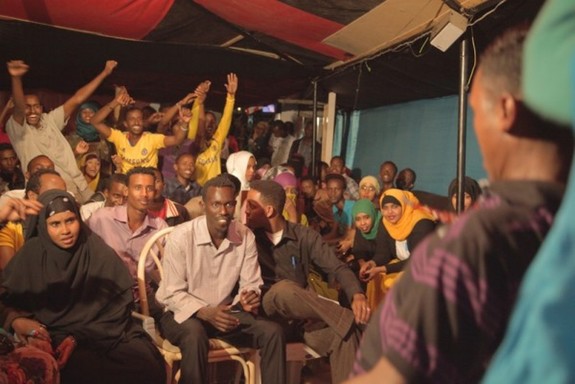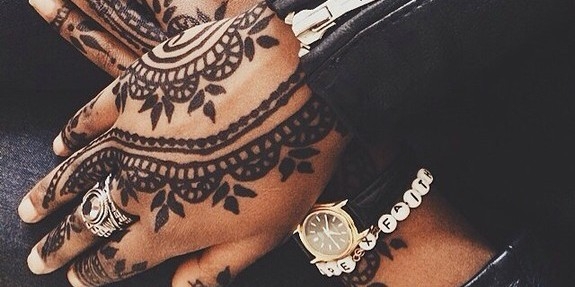Kenya | Traditional families in ‘little Mogadishu’ reform their ‘westernised’ children by force.
A moral majority campaign is sweeping through ‘little Mogadishu’, the Somali district of Eastleigh in Nairobi, Kenya. Families force girls to wear hijab and get circumcised; boys get beaten until they at least renounce the ‘evil spirits’ that led them either to crime, drugs or same-sex relationships. Even Somali families based in the West send ‘wayward’ children home to be forcibly ‘returned to the culture’. Reason: ‘Western influence’ has led to moral decay and crime in the formerly quiet and wholesome Somali community and it has to be fought tooth and nail. That, at least, is the view of the traditionalists, among whom many Imams and principals of reform institutes that have mushroomed in the area.
The Eastleigh business district of Nairobi has always thrived on migrants and the trade they bring. But ever since war erupted in Somalia in 2006 and tens of thousands fled into Kenya, the majority population has become Somali. Eastleigh, also known as ‘little Mogadishu’, is now home to the largest Somali community in the world and a hub for ‘returnees’ from the worldwide Somali diaspora. It is a community that, perhaps as a response to the chaos in their home country, or to the discrimination often encountered from Kenyans, or both, seeks unity, wholesomeness and tradition. One sips camel milk here; one visits one of the more than thirty mosques every Friday and hardly a woman shows her hair.
Short skirts and crime
Except for those who have migrated to the West and return to visit their relatives, either for the holidays or seeking to resettle, wearing short skirts and unashamedly drinking alcohol. They are blamed for everything that is wrong in Eastleigh, the traditionalists say: from the wave of gangsterism that has rocked the community in recent years to the increasing divorce rate.

Imam Ahmed Abdallah puts it succinctly in his sermon, this Friday, in the Eighth Street mosque. “Islam means having a respectable lifestyle”, he preaches to his faithful. "But it is undermined by confused and socially reckless Somali returnees from the so-called developed world.” In the Sixth Street mosque, further down, the Imam castigates his audience for sending their children to Europe ‘hoping for money to come to Nairobi’. “This is the cause of the disaster we are witnessing here”, he says. “Pray to Allah and you will get a decent living, even here in Africa.” Leaving the mosque, local elder Hassan Koronto tells me he has “never seen this kind of unity, zeal and gusto” among all the Imams of the thirty mosques in Eastleigh. He feels the campaign is long overdue.
“These returned gangsters mug people on their way to the mosque”
Business man Abdi Ali agrees. “In the old days we had only pickpockets but now, gangs are stabbing and mugging people on their way to the mosque. It’s those returnees from Europe. Some of them are even wanted by the police there. They must be reformed.” Dagan Elis –meaning ‘Return to Culture’ – is the answer provided by the mosques and Islamic health centres that fight the frustration, trauma, alienation and drug abuse that has seen many Somali youngsters in Eastleigh get recruited by violent and ruthless gangs in recent years. Surely, they hope, if families stand together with their religious leaders and school principals, they can reform the uprooted new generation?

In some cases the reform approach has worked well. At least former gang member Abdi Weli feels that his forced detention inside the Islamic health Centre Princess Zahra has helped him. “It did make me better, though I didn’t like it at first. It is true that I was involved in high level criminality in London.” His concerned parents had taken him back to Eastleigh ‘for a holiday’, he says. “But I was tricked to visit Princess Zahra –thinking I was to see a cousin of mine studying there- and dragged inside, kicking and screaming, by some heavily built men.” It took three months of Islamic teachings to reform him. “Now that I am better, I want to stay in Eastleigh. I’ll set up a business and start a family.”
Chasing the evil spirits
But in the eyes of the traditionalists, it is not just crime that is the problem. All ‘western lifestyle’ is seen as contributing to the erosion of the community, the tradition and the good old family values. Roble Shabaraq was never a criminal, but he was committed to the same Princess Zahra institute because he was gay. “My parents found out I had a same-sex relationship. Without telling me what the plan was, they took me from London on a trip back home and detained me at Princess Zahra.” The treatment included prayers, traditional medicine ‘made of various trees’, lectures, and beatings on his genitals ‘to chase the evil spirits’. He suffered through it for six months and started pretending he had reformed. “I have a boyfriend here now, but we keep it underground.”
“I have a boyfriend here now, but we keep it underground”
To some in Eastleigh, attacking everything that reeks of ‘western’ culture is uncalled for. “I know quite a number of returnees who have started good businesses”, says shop owner Ibrahim Karur of Twelfth street. “They are building the skills of local Somali youth. People see only the crime, but there are plenty good examples." Local academic and researcher Shukri Nassir agrees: “Financial remittances from Europe contribute to many a flourishing business in Eastleigh. These businesses then donate to mosques. So it is hypocritical, when preaching from these very mosques, to condemn everything that comes from Europe.”
Local trader Dahir Amedo, of Fourth Street, is particularly appreciative of westernised women, he says. “They are self-sufficient. They don’t ask you for money all the time. And they have not undergone female genital cutting, like the majority of our women. You don’t enjoy sex with the local women, because they suffer pain as a result of the circumcision. But with westernised Somali women you both enjoy. That makes for a healthy relationship.”
The only problem –and, to many in Eastleigh, this is one of the main problems that the community is suffering- is that Dahir Amedo is already married. He has abandoned his wife, Batulla Amedo, for ‘one cursed Somali woman from Holland,’ as she puts it when I interview her separately. “We were married for fifteen years”, she says, tearfully. “He was religious, friendly and understanding. But thanks to that one from Holland he is now a violent and abusive drunkard and pot smoker and he rarely comes home. That girl from Holland has hired an ensuite room in local Eastleigh hotel where they chew khat, drink beer, smoke pot and throw parties with other women residing in the same hotel, who are also husband snatchers.”
Defending family values
Batulla Amedo has started a women’s group in the area that fights to defend old fashioned decent family life. Very soon, she says, she will “mobilise my fellow heartbroken Somali women in storming that hotel and disciplining these westernised mistresses.’’ Her neighbour, Nasra Alinshe, adds that they also want to “take our cases to various western embassies in Nairobi for them to stop these marauding women breaking our families and causing us pain.”
The housewives plan to discipline the mistresses
Traditional families who fear that their daughters are going ‘bad’ (aka become ‘westernised’), can commit them to the Abu Hamza institute, also in Eastleigh. “Here, they learn to speak in low tones, avert their eyes from men, wear hijab, and know our important religious teachings”, says Matron Maryam Mursal proudly. “When they leave here they are changed. They are fine. They can marry a decent Muslim boy.” Aunt Asha Bardad, who has a niece in the centre, agrees. “She has been here for a month now and we have already seen much change. She is making progress.”
One wouldn’t know it from the happy cheers (in which I detect British accents and several other foreign languages) of the eighty-seven girls presently playing volleyball inside the Abu Hamza patio, but they have all been forcibly circumcised as well. The teachers proudly tell me that medical doctors conduct the procedure on the premises. It is the ‘small’ Sunnah cut, I am told: not as invasive and unhealthy as the traditional pharaonic sewing shut of the vagina, but mutilating nevertheless. “When they arrive they faint, shout, cry and try to run away”, says security guard Mike Oluonya. “That is why we guards are here, to prevent them from running out to their embassies.”
The practice horrifies Zeinab Ilkaase, from Grønland, Norway. She is here to visit her family, but she has no time for their traditional views. “I support them financially. I discuss with them, but they can’t control me.” She knows that some neighbours think she is a ‘husband snatcher’, but shrugs. “I don’t kidnap or hijack these men. They flock to the hotels where we visitors stay. As for what they do to their poor daughters in these institutions, it must stop.”
Learning to be better partners
Remarkably, in the turmoil between tradition and modernity that is shaking Eastleigh, housewives Batulla Amedo and Nasra Anshile have come share Ilkaase’s view on this. They have abandoned the view that girls should be circumcised. “As much as we disagree with their adulterous ways, we must also learn from the westernised women. Men enjoy sex with them because they are not circumcised. Therefore, we must abandon that practice and learn how to be better partners.” Amedo and Anshile have already linked up with a surgeon in Nairobi who can conduct clitoris repair services. Amedo: “We shall also contact the reform institutions and warn them that they must stop FGM, or we will report them to the authorities.”
A surgeon in Nairobi can conduct clitoris repair
Amedo’s group now also hosts workshops where Eastleigh women can come together to talk about their family problems –and about the pros and cons of the way women are in the West. Maybe there is something to be said for more equality between partners, whereby the woman can not only enjoy sex, but also be a friend to her partner, discuss issues, and be less dependent financially? “We groom one another now in this way”, Amedo says. “And my husband and I are talking again. He still smokes pot but he is home more regularly and much less abusive.”
Modernity creeps in
And so modernity creeps into Eastleigh in unexpected ways. Whilst the reform campaign still rages, youth in the area have started to flock to music studio’s like Waayaha Cusub (‘New Dawn’), where bands play, one smokes water pipe and discusses everything, from crime to the war in Somalia to youth community programmes.

The place is home to a project that seeks to turn Somali youth away from the violence preached by Somali militant group Al Shabaab, but also to lifestyle debates. “We don’t discriminate on any grounds of tribe, race, gender or sexual orientation”, says initiator Hussein Ali of the Waayaha Cusub club. Among the youth frequenting this hang-out are Roble Shabaraq and his boyfriend. “I come here to take my community by the hand and educate them," he says.
Abjata Khalif is a veteran reporter of Somali background in Garissa, Kenya.


